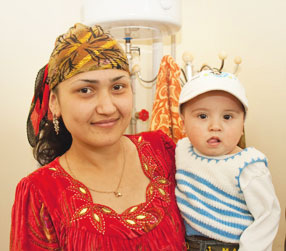RVF has been working in cooperation with the Tajik Ministry of Health (MOH) and Tropical Disease Center to combat high rates of helminth, or intestinal parasite infestation rates in Tajikistan. RVF supported a national deworming campaign in 2012-2013 which provided deworming medication and hygiene education to over 4.3 million individuals in Tajikistan. In 2014 RVF continued to support the Ministry of Health in developing national guidelines on parasitic diseases and further strengthening lab diagnostic techniques for intestinal helminth survey and diagnosis through the training of lab specialists.
Here is a video about RVF’s completed deworming program in Tajikistan:
Background:
A baseline study identified that over 50% of school-aged children in Tajikistan were found to be infected with intestinal parasites before RVFs deworming program began. The most common offenders were as follows: E. vermicularis (pinworm), A.lumbricoides (ascaris or roundworm), Hymenolepis nana (dwarf tapeworm). As a consequence of the high worm burden the median hemoglobin of schoolchildren is in the anemic range.
- The main causes of infestation in Tajikistan are the following:
- Contamination of water sources with raw sewage
- Low living standards
- Lack of sanitation education
- Intestinal worms cause children to suffer from:
- Reduced growth rates
- Learning problems & poor school attendance
- Malnutrition
- Anemia
According to the World Health Organization (WHO), the most effective way to reduce the morbidity associated with these soil-transmitted helminthes is to mount deworming campaigns using the safe, inexpensive and highly effective treatment with mebendazole/albendazole and praziquantel.
A Comprehensive Approach to Deworming
RVF conducted a nationwide deworming program in Tajikistan, modeled after the successful deworming program in neighboring Kyrgyzstan, which included hygiene education as well as deworming medication and emphasized local ownership and sustainability. Building local capacity by modernizing the laboratory diagnostic capability of the country through intensive training seminars for lab specialists to detect and identify these parasites was essential to the success of the program. The trained Tajik lab specialists conducted a nationwide baseline study, which as mentioned above, showed that the burden of intestinal worms exceeded 50%.
The nationwide deworming program targeted approximately 4.5 million individuals, who make up over 50% of Tajikistan’s population. The program was implemented entirely by local public health personnel and included treatment with albendazole and praziquantel (PZQ), social mobilization, educational activities emphasizing personal hygiene – all monitored closely by RVF personnel.
In accordance with WHO recommendations there were two rounds of deworming:
- The first round (April 2012) targeted all children ages 1-17 years (2.65 million individuals) and all women of childbearing age (1.9 million individuals)
- The second round (September 2012) targeted all children ages 7 – 17 years (1.7 million individuals)
- The total population treated was approximately 4.3 individuals
Following the completion of the two rounds of deworming Tajik specialists conducted a second epidemiologic survey, which allowed local health officials to compare pre- and post-treatment rates of infestation and assess the need for follow-up measures. Rates of infection were reduced significantly post-treatment, with 6% of those surveyed infected with an intestinal parasite as compared to over 50% before the intervention.
As mentioned above, in 2014 RVF supported the Ministry of Health in developing national guidelines on parasitic diseases and further strengthening lab diagnostic capacity through the training of lab specialists. Cross-border training was conducted for lab specialists in Tajikistan with facilitation by the three RVF-trained specialists from Kyrgyzstan. As a result of the training, a national lab survey was conducted to help determine the effectiveness of a mass deworming campaign that was implemented in September 2014.
